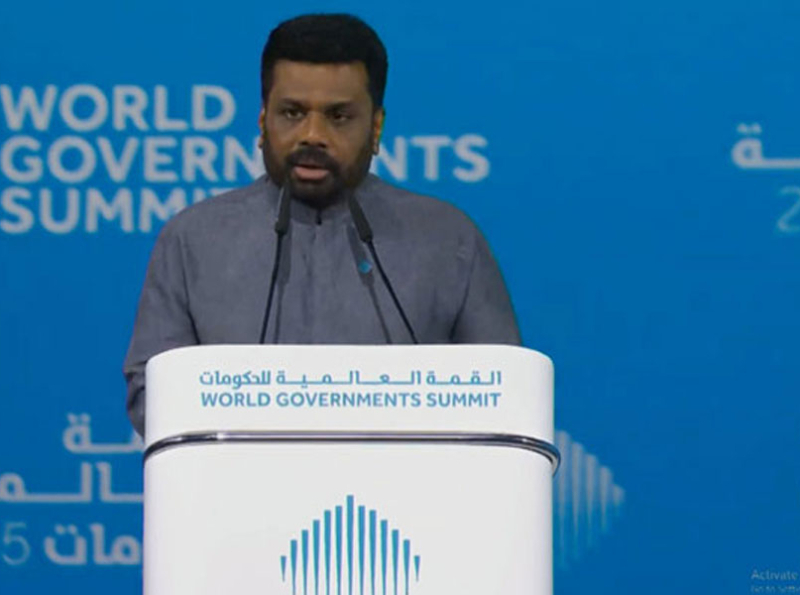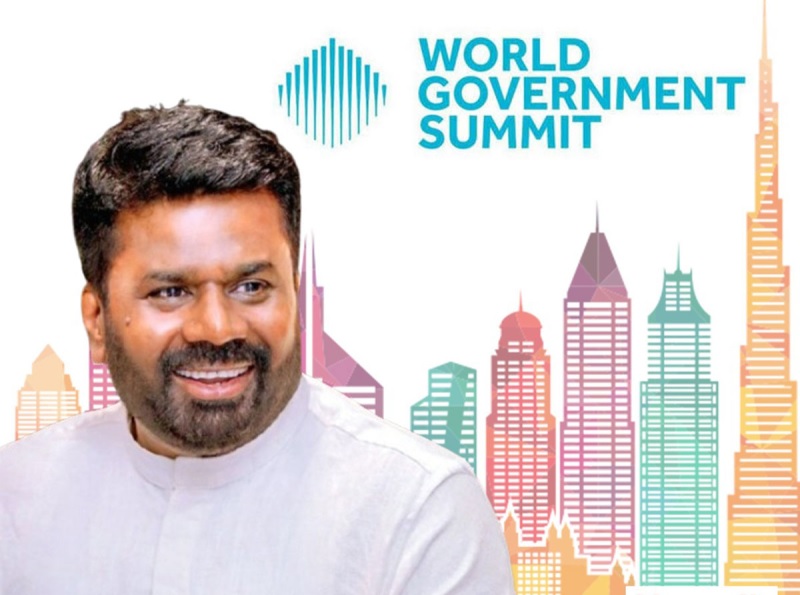“President Dissanayake’s Global Speech: Visionary or Missed Opportunity? Here’s What He Could Have Done Better!”
Critical Analysis of President Anura Kumara Dissanayake’s Speech at the 2025 World Governments Summit
While President Anura Kumara Dissanayake’s speech at the 2025 World Governments Summit certainly contained several admirable points about global cooperation, sustainability, and Sri Lanka’s digital transformation, there are several critical areas where his address could have been more impactful and resonant. His message on global unity, sustainable growth, and financial reforms was not particularly groundbreaking, often relying on well-worn rhetoric without offering much in terms of innovative solutions. Furthermore, his focus on global issues, while important, missed a key opportunity to demonstrate a deeper understanding of Sri Lanka’s own unique challenges. Below are some areas where the speech could have been more nuanced and assertive.

Repetitive and Stale Call for Global Unity
President Dissanayake’s central message was a call for global unity in addressing climate change, the financial crisis, and technological disruptions. While this is undeniably important, the emphasis on collective global action and the plea for “global citizens to come together” was repetitive and lacking fresh insights. These are themes that have been widely discussed at international forums for years, with little new presented on how to overcome the existing barriers to cooperation. Dissanayake could have gone further by offering more concrete examples of how Sri Lanka, as a developing nation, plans to navigate these global challenges—showing not only that he is aware of the issues but that he has viable, actionable plans for his own nation within the broader global context.
Vague Approach to Sri Lanka’s Vision for Growth
Dissanayake’s mention of Sri Lanka’s “vision for economic growth, innovation, and governance reforms” came across as vague and lacking specifics. His reiteration of Sri Lanka’s commitment to sustainable development and fairer global financial systems is commendable but didn’t offer any innovative ideas or fresh perspectives that would set his vision apart. It seemed more like a rehash of general economic and governance rhetoric, which has been repeated by countless world leaders without leading to real change. For a leader hoping to capture international attention and inspire action, a more focused approach, highlighting specific reforms or innovations within Sri Lanka, would have been far more effective.
Additionally, while Dissanayake acknowledged the need for financial reforms, the lack of detail on how Sri Lanka plans to overcome its own financial challenges—such as debt restructuring, inflation, and economic recovery—was striking. Given Sri Lanka’s ongoing financial difficulties, a more grounded discussion on practical solutions would have lent more credibility to his vision.
Over-Simplified Views on the Global Financial System
When discussing the “growing instability in the global financial system,” Dissanayake raised valid concerns about sovereign debt crises and fragile financial structures. However, his call for financial reforms was notably general and somewhat disconnected from Sri Lanka’s own economic situation. He rightly pointed out that current financial systems fail to address widespread challenges but did not propose any tangible reforms or demonstrate an understanding of how these systemic issues might be addressed at the international level. In a world grappling with rising debt and inflation, more specific proposals—such as advocating for debt relief mechanisms, greater financial inclusivity, or regional financial cooperatives—would have made his address far more relevant and compelling.
The Digital Transformation Focus: Over-Reliance on External Partnerships
One of the stronger aspects of the speech was the announcement of Oracle’s support for Sri Lanka’s digital transformation. The idea of establishing a Digital Transformation Hub in Colombo Port City and positioning Sri Lanka as a leader in AI and cloud technology is certainly ambitious. However, the reliance on Oracle, a foreign tech giant, to spearhead Sri Lanka’s digital future raises questions about the country’s own capacity to lead such a transformation.
Dissanayake’s focus on foreign partnerships as the primary avenue for digital transformation risks overshadowing the importance of developing homegrown solutions and empowering local talent. While collaboration with global companies is undoubtedly important, the president missed an opportunity to emphasize how Sri Lanka intends to build its own technological infrastructure, invest in local tech startups, and create a self-sustaining digital ecosystem. By focusing too heavily on Oracle’s potential involvement, Dissanayake’s vision seemed more reactive than proactive, leaning too much on external forces to drive change.
Lack of Personal Connection to Domestic Realities
Although Dissanayake’s speech was delivered at a global summit, the lack of direct reference to Sri Lanka’s current domestic struggles may have detracted from its effectiveness. While he invoked Martin Luther King Jr.’s call for unity, there was little reference to the realities faced by Sri Lankans today. Issues like political instability, the country’s post-crisis recovery, unemployment, inflation, and the challenges of public sector reform could have been better integrated into the speech. By focusing primarily on global issues without connecting them to the daily lives of Sri Lankans, the president missed an opportunity to create a stronger emotional connection with both domestic and international audiences.
The Call for Collective Responsibility: Unclear and Overly Idealistic
The closing appeal for global unity and collective responsibility, although well-intentioned, was overly idealistic and lacked a clear, actionable pathway for how such unity might be achieved. Dissanayake’s words, “We must learn to live together as brothers,” are certainly noble, but they fail to address the complex political, economic, and ideological divisions that exist both within countries and on the international stage. The global community is far from united, and a more realistic and pragmatic approach to fostering cooperation could have been explored. Offering specific proposals for global diplomacy or multilateral engagement would have made this call to action feel more grounded and achievable.
A Vision to Match His Campaign Promises
It is worth noting that during his election campaign, President Dissanayake demonstrated a vision that set him apart from his opponents and predecessors. His ability to present ideas that felt innovative and forward-thinking earned him significant support. However, this global address fell short of replicating that same vision and level of foresight on the international stage. The expectations placed on Dissanayake were high, given his previous articulation of a modern and dynamic Sri Lanka that would excel in global matters. While his speech at the summit touched on critical issues, it lacked the same edge and ambition that made him a strong candidate for the presidency. To build upon the momentum from his election, Dissanayake must bring the same level of vision and energy to the global arena that he promised at home.
His First Global Address: The Potential Is There
This speech was, after all, President Dissanayake’s first global address. There is no doubt that he has the potential to be a leader on the world stage, but he must rise to the occasion and deliver more than what was presented at the summit. Many have praised him for making the speech in Sinhala, breaking down language barriers and staying true to his roots, which is a commendable move.
President Anura Kumara Dissanayake could draw inspiration from various global leaders to shape Sri Lanka’s future. From Jacinda Ardern (New Zealand), he can learn empathetic leadership that prioritizes inclusivity and social well-being. Nayib Bukele (El Salvador) offers valuable lessons in digital innovation, particularly in leveraging technology for economic advancement. Cyril Ramaphosa (South Africa) demonstrates the importance of sustainable growth and regional cooperation, which could benefit Sri Lanka’s long-term development. Lula da Silva (Brazil) focuses on social justice and economic equity, providing guidance for addressing inequality. Finally, Mahatma Gandhi (India) exemplifies the power of nonviolent governance and self-reliance, offering a path to peaceful and locally-driven progress. These leaders provide a balanced approach of innovation, social equity, and sustainability that Dissanayake could apply to Sri Lanka’s global aspirations.
Room for Improvement
As a leader, Dissanayake has the potential to be more visionary and impactful, but he needs to deliver more than just generic rhetoric. The world is seeking new solutions and bold leadership, and a more innovative and grounded approach would position him as a true trailblazer in Sri Lanka’s future and certainly he has to potential .







